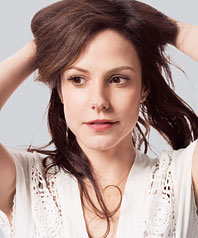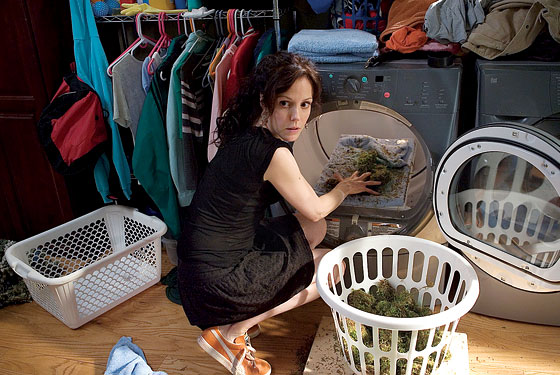
Like many people who appear on TV, Mary-Louise Parker doesn’t watch a lot of TV. This makes sense, if you think about it; if you worked at a circus, you probably wouldn’t spend much of your downtime going to other circuses. But a few weeks ago, at the house in L.A. where she’d been staying while filming the third season of Weeds, she was feeling a little under the weather, and her 3-year-old son was safely in someone else’s care, so Parker decided to kick back in front of the tube. And then something embarrassing happened. She couldn’t figure out how to turn on the TV.
“I got so depressed,” she says, recalling this moment during a recent lunch in the West Village. “I just wanted to lie there and watch something. And I couldn’t get it turned on. My assistant was out of town. How pathetic is that?”
All Parker wanted was a lazy hour spent with a veg-out-friendly show. “I like A&E. I like those corny intimate-portrait things. They’re so kind of ingenious and artificial and soothing.” This genre of program, from Biography to VH1’s Behind the Music, has a hypnotic lure, as it reliably packages people’s lives into a familiar, uplifting arc: the ascent (band rocks hard; actor breaks out), the crisis (drummer loses arms; actor totals car while high on blow), and the optimistic dénouement (band reunites; actor emerges from obscurity to get late-life Emmy nomination).
The natural, unavoidable, slightly James Lipton–ish question, of course, is this: So, Mary-Louise Parker—single mother, longtime earner of plaudits, target of furious tabloid fascination after your boyfriend left you when you were pregnant with his kid—if you were the subject of such a biography, where would you be in that narrative arc right now?
“Assuming I have one 90-minute special?” she asks.
Yes.
“How does the arc go again?”
Ascent, crisis, optimistic dénouement.
“Somewhere around there,” she says. “Optimistic dénouement. Though optimistic is a big word for me. But you don’t want to anticipate any more crises in your life.”
As an actress, Parker is a cultish taste; she doesn’t have fans, she has converts. The road-to-Damascus moment may have come with Fried Green Tomatoes, in 1991, or when watching her as the deliciously marble-mouthed Amy Gardner on The West Wing, or seeing her onstage in Proof, or watching her play Harper, the hallucination-prone Mormon in HBO’s Angels in America, in 2003, a performance that won her an Emmy and, had the movie aired in theaters, might well have won her an Oscar. (She certainly should have beaten out Renée Zellweger’s jug-band mama from Cold Mountain.) Actresses like Zellweger may be more famous, but they enjoy a generalized, ambient popularity. Parker’s followers huddle together like chowhounds who’ve discovered a fantastic, out-of-the-way restaurant.
Still, for most of her career, Parker has been best known for two things: (1) delivering stunning stage performances (Prelude to a Kiss, Proof), then being passed over in the film versions for lesser actors but bigger stars, and (2) being that talented actress who never quite broke out, whose name was too easily confused with Penelope Ann Miller or Mary Stuart Masterson, who never had that one big romantic-comedy smash (the kind of movie in which, as she says, “there’s a montage where the girl tries on a lot of hats, then goes on a date”). So instead, she got saddled with that qualified compliment, the “thinking man’s sex symbol,” as though discerning her appeal required a devoted period of apostolic study.
Then she became known for a third thing. In 2003, her longtime boyfriend, actor Billy Crudup, left her, apparently for his younger co-star Claire Danes (denied at the time, but the pair coupled shortly thereafter), when Parker was seven months pregnant. This was personally devastating, obviously. Four years later, she says, “It’s weird to me the way that people receive it. Not so much that they speculate on it, but that they feel they have the right to comment on it.”
But the general reaction to her breakup was not the usual prurient, someone-got-shipped-off-to-rehab gleeful wallowing. Instead, it pricked a primal nerve. Whatever emotional messiness had been splashed behind the scenes, the public story line was linear and pure: Dumped by a cad! Whilst pregnant! With his baby! No one confuses her with Mary Stuart Masterson anymore. In the cold calculus of celebrity, the worst possible thing in the world actually helped her. It made her sympathetic. It made her relatable.

To find Parker now, at 43, on Weeds is, for the cultish fan, to be both thankful she’s got this showcase and wistful for something more—shouldn’t this woman be off torching stages, stealing films, hoarding Oscars? Parker’s career is a testament to the fact that there’s a hunger for a woman who, as our own TV critic John Leonard (himself an unreconstructed Parkerphile) once wrote, can seem like she’s “always thinking about three things simultaneously, one of them scandalous.” Her characters often teeter on the brink of lunacy, but charmingly. Or, as one MLP devotee put it to me, “She’s convincingly smart. You know—she’s not Drew Barrymore.”
In fact, imagine for a minute that Barrymore starred in Weeds. The show would be a buffoonish disaster, rather than a compellingly kooky examination of what one suburban mother will do to keep her family together (sell pot) and what repercussions that has on her (occasionally jumping nearly naked in the swimming pool and screaming her head off underwater). Given how, in two seasons (the third premieres August 13), Weeds has drifted from a semi-plausible family drama to a brazen farce, it sometimes seems that Parker’s not just scrambling to keep her family together, she’s scrambling to keep her show together. She turned down the Teri Hatcher role in Desperate Housewives (and imagine that alternate reality, Parker exiled to Wisteria Lane, picking her teeth with the likes of Nicollette Sheridan), but said yes to Weeds because, as she says, “it was uglier.” Since then, it’s gotten prettier. “I think the pilot was uglier than the show turned out to be. Sometimes it slips into more broadly comic, which is not my favorite. I like it best when it lives in that more bleak, black-comedy place.”
Bleak, black, comic: That’s not exactly soothing. That’s not Drew Barrymore. That’s not a neatly packaged story of ascent (critically beloved young actress!), crisis (left pregnant and alone!), and optimistic dénouement (now star of her own TV show!). But people only live their lives like that on A&E. “Those shows follow a formula, so you know what’s coming,” she says. “They have happy endings. Sometimes you kind of need that.”